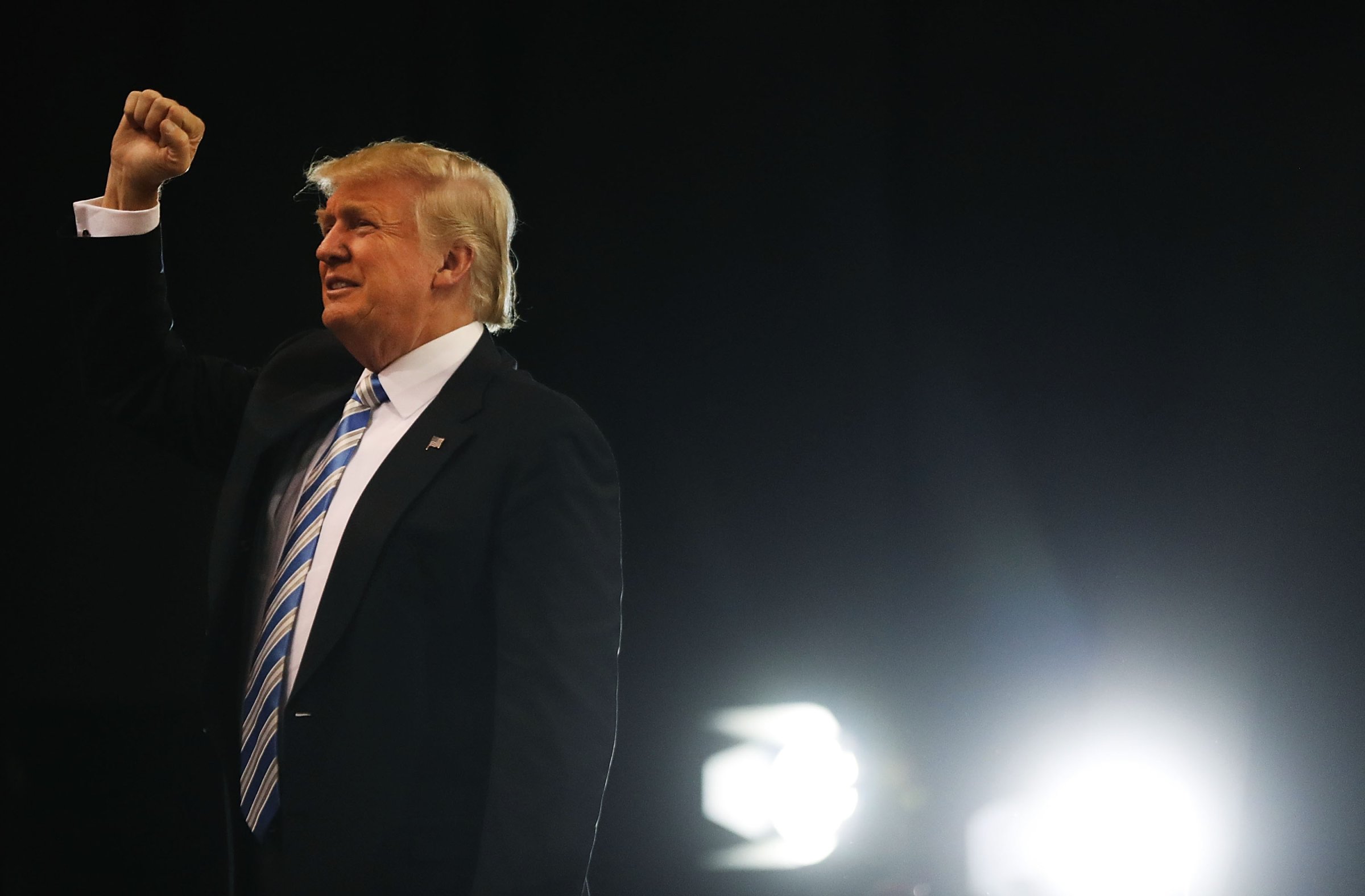
Nesbit was the communications director to former Vice President Dan Quayle and is the author of Poison Tea.
Supporters of GOP presidential nominee Donald Trump have begun to use an old German word—once invoked by Nazis and now currently in vogue with far-right political activists in Germany—to attack American media covering his campaign.
The phrase is “Lügenpresse,” which means “lying press.” The phrase rose to infamy during the Nazi era and was resurrected in 2014 as a watchword with Germany’s anti-immigrant activists who wanted the media to “tell the truth” about refugees in their country—most of whom were Muslim refugees fleeing from war-torn areas caught in the middle of the ISIS conflict.
Now, Lügenpresse has traveled across the ocean to Trump rallies and social media posts from Trump’s legion of alt right supporters, and it’s being aimed at both the media and the presidential campaign of Democratic nominee Hillary Clinton.
Buzzfeed’s Rosie Gray, one of the first reporters to chronicle Trump’s rise alongside core elements of the alt right movement, recently tweeted a video that captured two Trump supporters shouting the phrase at the members of the media covering the Republican Party’s presidential nominee at a convention center in Cleveland, Ohio.
In the video, one of Trump’s supporters coaches another supporter on the proper use and pronunciation of the phrase as they shout at members of the media contained inside a pen at the Trump rally. Journalists covering Trump’s campaign are confined to pens at the back of rallies and have been constantly harassed in recent weeks by Trump supporters.
“Lügenpresse! That’s what you are,” one of the Trump supporters shouts. “What?” the second supporter asks? “Lügenpresse!” he shouts, and then asks whether he was pronouncing it right. “You said it right,” the first supporter confirms. “You’re all in bed with the Clintons. You’re all bought and paid for, every one of you” the second shouts.
Buzzfeed editor-in-chief Ben Smith, retweeted her video, adding “Word is popular right now on the German far right.”
Lügenpresse was used so much in Germany by far-right protesters in recent years, in fact, that the revived Nazi-era phrase became the dubious winner of the “non-word of the year” competition created by a panel of German linguists in 2015.
“‘Lugenpresse’ is a word contaminated by the Nazis,” Nina Janich, a professor at the Technical University Darmstadt and head of the six-member jury of linguists who selected the winner, told Reuters. “It’s used deliberately in the (anti-immigrant) movement to steer it against those (in the media) who criticize their movement.”
Trump’s antipathy toward the media has become especially pronounced in recent weeks as journalists have covered the stories of nearly a dozen women who have come forward to accuse him of improper sexual misconduct and stories raising questions surrounding the financial dealings of his business organization and foundation.
Trump routinely shouts at the media during his speeches, calling them “dishonest” and responsible—along with international elites, the Clinton campaign and various global forces aligned against him—for “rigging” the election and spurring anticipated voter fraud (which is almost non-existent now in the U.S.).
Trump supporters have picked up on the cue. Besides its use at Trump rallies, the Twitter hashtag #Lugenpresse has begun to show up in alt right and Trump supporter social media posts.
“The #Lugenpresse wants us to believe (Clinton) is ‘leading’ in the “polls”? Barring skullduggery #HillaryClinton will lose big time to #Trump,” tweeted one Trump supporter. “The media is literally interviewing every woman Trump has come into contact with in order to find one to make up allegations. #lugenpresse,” tweeted another. “We all see the constant, coordinated attacks,” a third tweeted. “Even D’s see your bias. Destroyed your credibility to prop up Hillary. #Lugenpresse.”
The constant refrain about the “dishonest press” may explain what Trump might move toward if he loses the election. If Trump genuinely believes that the “lying press” cost him the election, he could decide to create his own media effort alongside Breitbart News (the media arm that, in its own words, has served as “Trump central” for the better part of a year and whose former chairman, Steve Bannon, serves as Trump’s campaign CEO).
There is also the fear that such talk could lead to confrontations during and after the election.
Trump said at the close of the third and final presidential debate that he may not accept the results of the presidential election. It is a stance that has clearly hurt him in recent polling—an ABC News tracking poll Sunday found that Trump now trails Clinton by 12 points nationally. The question now is whether his supporters will pick up on his cues and take “Lügenpresse” beyond the confines of the rally media pens and social media—and into the streets.
More Must-Reads from TIME
- Inside Elon Musk’s War on Washington
- Why Do More Young Adults Have Cancer?
- Colman Domingo Leads With Radical Love
- 11 New Books to Read in February
- How to Get Better at Doing Things Alone
- Cecily Strong on Goober the Clown
- Column: The Rise of America’s Broligarchy
- Introducing the 2025 Closers
Contact us at letters@time.com